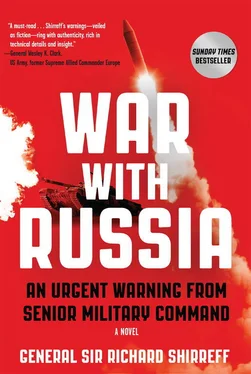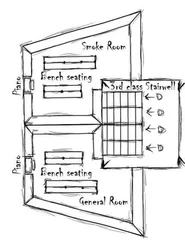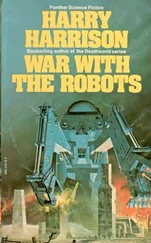Morland looked at him in stunned admiration and, in that moment, knew that with soldiers like Lukša, they’d get out of this somehow. He felt a surge of adrenalin kick in. And anger. Unaccountably the fear had gone. He looked at Bradley, SA80 again on automatic, continuing to fire above the barley.
“Boss!” Bradley shouted. “The gun group are in action. The fire is easing off.”
Morland risked another look above the corn. From the corner of the forest behind them was the unmistakable and pleasingly familiar noise of burst after burst of GPMG. Cleverly sited in defilade, it was out of sight of the Russians manning what had to be a 12.7 millimeter heavy machine gun. Had the Russians been able to see them, it would have been no contest: Archer and Watson would soon be dead meat. Instead, they were doing good work and he could see their tracer landing all around the machine gun position to their left. Then the fire coming from that direction stopped. And that gave them the briefest of respites as the Russians turned all their fury on the GPMG.
Bradley grabbed Lukša and, helped by Krauja, dragged him on his back through the corn like a life-saver pulling a drowning man to shore, while Morland and Webb continued to engage the enemy.
Inch by inch, foot by foot, they fought their way forward through the corn. Never had fifty meters taken so long but eventually, sweat streaming down their faces, they reached the edge of the sunken lane, slid under the hedge and into the bottom. How they had not all been killed was still a complete puzzle to Morland; they had been little more than stationary targets out there in the corn. Moreover, the compound guards were bound to have sophisticated night sights in those watchtowers—which was probably why the lights had been switched off—and that Korda could have hosed them down in seconds. The more he thought about what had just happened, the less sense it made.
Morland took a quick pull on his water bottle. His throat was raw with all the shouting and he needed all the energy he could muster. Leaving Krauja to continue to administer first aid to Lukša, Morland and Webb crawled up the other side. The heavy machine gun from the watchtower had given up trying to hit the GPMG team and now switched back to them. Tracer was smacking into the barley fire fifty yards behind them, where they’d originally been contacted. However, the rounds coming from their rear left had suddenly stopped; Archer and Watson must have knocked out that light machine gun, although fire was still coming from the machine gun to their right. They might be safe for the moment, but they were not going anywhere. They were trapped.
“I’ve given the reserve group the grid of the enemy gun group on the edge of the forest line to our rear right!” yelled Webb in Morland’s ear. “They’ve got plenty of fire power so they should be able to suppress them.”
“What about air?” asked Morland, marveling at how laid-back he was now feeling after the initial terror of the ambush. “There’s no way we’re going anywhere until that heavy machine gun is knocked out. And the air assault is due in any minute.” The luminous dials on his army issue G1098 watch told him it was 0315.
“Don’t worry about that. My guys at the LZ can guide them forward. And I don’t think the air assault will need much guiding in. They’re getting the full light show after all…” Webb gave him a grin. “We’ll stay put and help look after you guys. Anyway, I’ve got to guide the air onto the compound, and for that I need eyes on.”
Webb stopped and listened to his earpiece. He then turned back to Morland. “F-16 with Maverick inbound. Time on target, five minutes. Time to paint the target.”
With that he reached into his daysack and pulled out his An/PEQ-1 SOF Laser Marker, a hand-held, laser target-designator, the size of a small video camera. He switched it on and pointed it at the watchtower where their tormentor was located, looking through the optical sight as he did so. As he held it steady on the ground, an intensely focused laser beam—invisible to the men in the tower—shone at the target. It would be picked up by the sensor on the incoming aircraft; the muzzle flash of the Korda being Webb’s aiming point.
They waited, Webb locked onto his target as if he was on the range and firing a rifle. Then, high above them and just audible, even above the firing, Morland heard the familiar scream of a fast jet engine.
“Won’t be long now,” muttered Webb. “Stand by for impact…”
0200 hours, Sunday, July 9, 2017, Central European Time
0300 hours, Sunday, July 9, 2017, Eastern European Time
25,000 feet above Kaliningrad
“GIANT KILLER, THIS is Apollo, refuel complete. Now on station as CAP.” Bertinetti spoke briefly into his microphone as his F-16 soared high above the flatlands of Kaliningrad, with Captain Mike Ryan tucked in close on his starboard side and just astern.
“Copy that, Apollo. Be aware. You’ve now got NATO’s Boeing E-3A Sentry aircraft providing air surveillance in case of enemy air attack. An Airseeker RC-135 Rivet Joint SIGINT aircraft from the RAF is also airborne and reports Russian C2 still down. SAM threat is minimal.”
“Roger, Giant Killer. Send sitrep regarding air assault landings.”
“Giant Killer. H-Hour confirmed, 0330, Apollo.”
Bertinetti breathed a sigh of relief. It was one thing to have flown in fast and low, hit the Pionersky radar site as ordered and then to extract quickly, but at the mission brief he had been less than happy to be told that the Buzzards of 510th Fighter Squadron would then be required to provide a two-ship CAP, combat air patrol, following their bombing run. At the time, expecting few if any of them to survive the attack, he had felt that was an order too far. However, he knew the drill well enough: just get on with it. There was no way he was asking anyone else to take on the extra tasking. Mike Ryan had caught his eye and nodded; he was Bertinetti’s wingman and that was an end of the matter. He was coming, too.
Mission complete, the other six aircraft had headed straight for home. The pilots would first debrief and then creep home and into bed, almost as if nothing had happened.
However, it was still very much happening for him and Ryan. Far to the east, and invisible in the dark forests far below, the first fingers of dawn were beginning to lighten the faint curve of the horizon. He checked the time: sunrise in an hour and then they too could return to Aviano. He stifled a yawn and tried to stretch his legs. He had been strapped into his seat for four hours now; his G-suit felt too tight against his body and he longed to remove his helmet to scratch his head. The F-16 was always a great aircraft to fly, but it was well past time to count his blessings and head home before his luck ran out. Nevertheless, he set his instruments, activated auto-pilot and settled back to cover the area of sky above south-central Kaliningrad in a series of “racetrack”—long loop—patterns.
It was not long before his radio burst into life again.
“Apollo, this is Giant Killer. Are you receiving me? TIC now.”
“Apollo, Roger. Send details.”
“Troops in contact, enemy grid 893456, south of Pravdinsk. Under fire from heavy machine gun. They have laser designator and are ready to paint the target. Be aware, target on edge of Iskander compound, possible that nuclear warheads have been armed. Accuracy essential.”
“Apollo, copy that. Out.”
At the words “nuclear warheads armed,” all the fatigue of a long night flight and his body’s craving for sleep vanished. Bertinetti checked his position. He entered the enemy grid reference into LANTIRN. The infrared navigation and targeting systems updated itself, giving him a time on target of five minutes. He called ground control again to get the marker to lase the target.
Читать дальше












